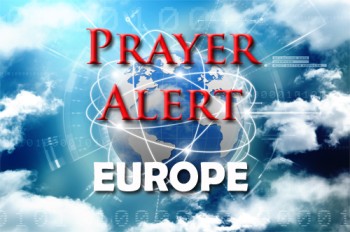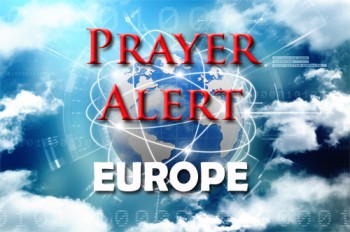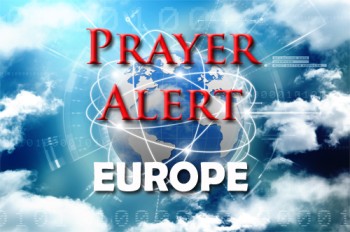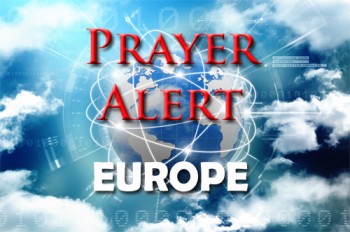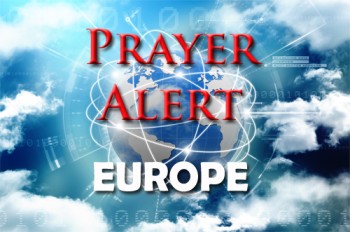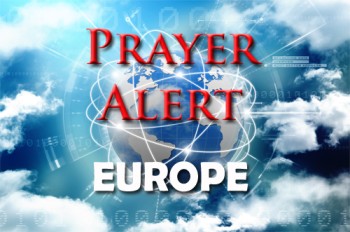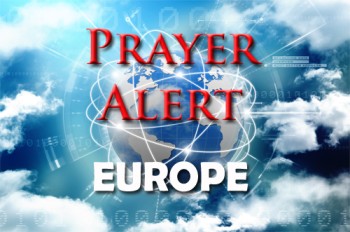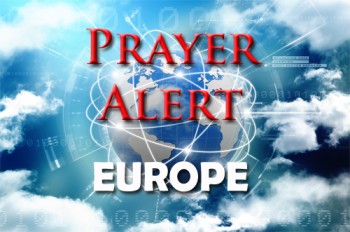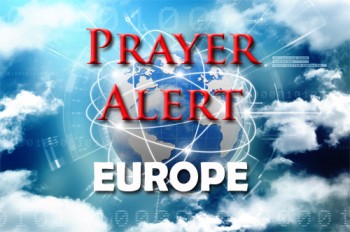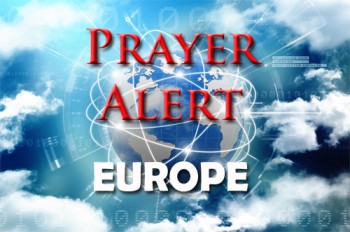Displaying items by tag: Europe
Canary Islands volcano danger growing
Lava from the Cumbre Vieja volcano, which has been erupting for four weeks, has destroyed even more homes and buildings. The two new vents that opened last week have partially collapsed, causing lava to flow in multiple directions. The local airport was closed again for two days and 800 more homes were evacuated as rapid flows of molten lava moved towards them, bursting homes into flames. There were 64 more seismic movements recorded, the strongest measuring 4.1. There are no signs of eruptions and earthquakes stopping soon. Over 1,100 buildings and 600 hectares of land had been destroyed by 13 October, and the next day the lava flows expanded again with even more evacuations ordered in three more areas.
Germany: anti-Semitism at football match
UEFA are investigating Union Berlin after shocking acts of anti-Semitism took place during a match with Israel’s Maccabi Haifa football team in a Nazi-built stadium. Before the game Maccabi players laid a wreath at Berlin’s Holocaust memorial. During the game a Jewish group of fans were subjected to anti-Semitic abuse and assaulted in the mixed area of the stands where fans from both teams sit together. They were threatened, pelted with beer, insulted, and one fan tried to set fire to an Israeli flag. UEFA said that an ‘Ethics and Disciplinary Inspector’ has been appointed to conduct a disciplinary investigation regarding discriminatory incidents. Police are also investigating the antisemitic abuse, which included other incidents around the stadium. Club president Dirk Zingler said, ‘This latest display of anti-Semitism, in a place so iconic for the Nazis, shows there is still work to be done to stamp it out in German society.’
Canary Islands volcano ‘much more aggressive’
The Canary Islands volcano has blown open two more fissures, and intense activity has worsened, three weeks after the original eruption. The prompt evacuation of more than 6,000 people since the 19 September eruption helped prevent casualties. By 3 October the lava had destroyed or partially destroyed 1,000+ buildings, including homes and farming infrastructure. By 7 October it had destroyed 21 miles of roads and entombed large areas of land, with no indication of lessening.
Germany: changes in leadership
On 26 September voters elected the Bundestag's parliamentary seats. The dominant political parties - SPD, CDU and CSU - finished only ten seats apart. Angela Merkel’s departure has opened up a large void. Many older MPs have been replaced by people in their thirties or even twenties. This rejuvenation will bring many openings for renewal and innovation in the current technological and global transformation, but will also pose potential risks that need prayer. Will Germany manage to keep its leadership in Europe, or will France supplant it? What can the EU expect from the new Chancellor and coalition on climate change, trade, and technology? How do the elected candidates see Europe’s place in the world? What will the results mean for Germany’s relationships with France, the USA, Russia, or China?
France: Catholic clergy sexually abused 216,000 minors
A report has shown that the Church prioritised protecting the institution over victims who were urged to stay silent. The number of abused minors rises to an estimated 330,000 when including victims of people with other links to the Church, like Catholic schools and youth programmes. Between 2,900 and 3,200 abusers worked in the Catholic Church between 1950 and 2020, out of a total of 115,000 priests and other clerics. ‘The Church is the place where the prevalence of sexual violence is at its highest, other than in family and friend circles’, said the report, which found that children were also more likely to be abused within Church settings than in state-run schools or summer camps. This report follows similar ones from other countries.
France: fishing in UK waters
Three-quarters of small French fishing boats could be denied access to British waters under a post-Brexit regime in a move that risks further damaging Anglo-French relations. The UK government had granted only 12 out of a total of 47 applications for licences for the French vessels under 12 metres long to fish the UK’s inshore waters. France’s maritime minister, Annick Girardin, condemned the decision. ‘It is a new refusal by the British to implement the conditions of the Brexit agreement despite all the work we have done together. French fishing should not be taken hostage by the British for political ends.’ In May, France’s response to post-Brexit fishing restrictions around the island of Jersey was described as ‘pretty close to an act of war’ by fishing community leaders in St Helier. This week Jersey refused licences to 75 French fishing boats. The UK said it would consider further evidence to support remaining bids for fishing rights See
Spain: update on La Palma volcano
Lava from La Palma’s volcano has now reached the Atlantic Ocean. When this happens there is a chemical reaction as hot lava boils the colder sea water. Volcanologist Dr Robin Andrews said, ‘It creates a steam of hydrochloric acid, water vapour and bits of ash. Volcanic explosions are possible because lava entering sea water creates a pressure-cooker situation that throws out volcanic debris.’ Authorities have set up an exclusion zone around the lava, including in the sea, to keep people away from any potential danger. Three coastal villages are now locked down. Please continue to pray for the hundreds of families whose homes were destroyed by lava, the 6,000+ evacuated people, the owners of destroyed banana plantations and businesses, and the pupils and parishioners of destroyed schools and a church. Authorities declared La Palma a disaster zone. Pray there will be enough financial support for everyone affected.
Spain: Canary Islands volcano eruption
A volcano on the island of La Palma began erupting on 19 September, sending streams of lava and plumes of smoke and ash into the air. A small earthquake preceded the eruption, causing thousands of residents to flee their homes and prompting authorities to begin evacuating the infirm and farm animals from nearby villages before the volcanic activity. By 20 September three streams of lava were pouring down towards the sea, moving at 2,300 feet per hour, and 6,000 people had evacuated their homes. Two days later new cracks started spewing more lava and four earthquakes shook the area. Families raced to save what they could from their homes in a two-hour window granted by emergency workers. The lava had already destroyed 300 homes, and overwhelmed roads, farms, a school, and swimming pools. Pray for those in temporary shelters not knowing when they will return home, fearing their homes might be engulfed by lava. Seismologists played down the attendant risk of an Atlantic tsunami.
Greece: migrants moved to EU-funded 'controlled' camps
Officials have started moving asylum-seekers to a new migrant camp on the island of Samos, Zervou, despite activists complaining that access controls are too harsh. A double barbed-wire fence surrounds the camp with surveillance cameras, X-ray scanners and magnetic doors. During the 2015/16 migrant crisis the previous camp on Samos sheltered 7,000 asylum-seekers despite its capacity being just 680. Campaigners had long denounced conditions there as deplorable. On 20 September at Zervou’s entrance police lined up the first residents, checking for weapons or dangerous objects. Asylum personnel handed out bedsheets and showed the migrants how to use the gate's magnetic entry cards. The new Samos facility is the first of several such camps on five Greek islands created with EU funds. All the ‘closed controlled’ camps can only be entered via fingerprint scans and electronic badges. Gates will remain closed at night and disciplinary measures await those who return after 8 pm.
France: football star paid for not talking about religion
Paris Saint-Germain (PSG) star Neymar will receive €6.2 million (£5.28 million) a year if he avoids any ‘political or religious propaganda that could damage the image and unity of the club’. It is understood that Neymar will receive this money as part of an 'ethical clause' included in his contract with the Parisian club. The 29-year-old has previously made several references to his Christian faith. He grew up going to Peniel Baptist church in his native Sao Paulo, whose lead pastor Newton Lobato has revealed the footballer tithes around €18,000 every year. Neymar once said, ‘Life only makes sense when our highest ideal is to serve Christ’. He has received trophies wearing a headband stating ‘100% Jesus’.
